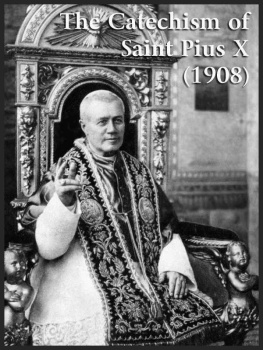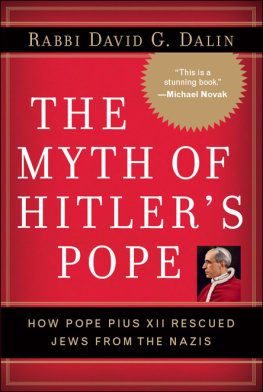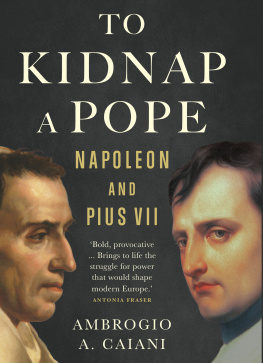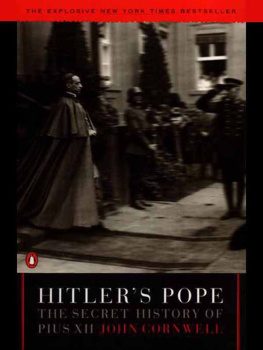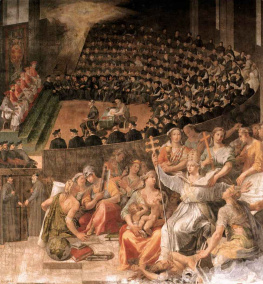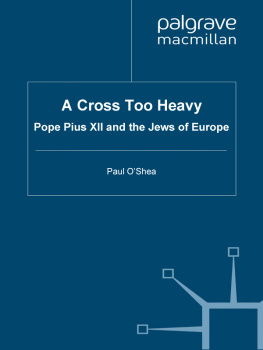Pope St. Pius X [Pius X - Catholic Catechism of Saint Pius X (1908)
Here you can read online Pope St. Pius X [Pius X - Catholic Catechism of Saint Pius X (1908) full text of the book (entire story) in english for free. Download pdf and epub, get meaning, cover and reviews about this ebook. year: 2010, genre: Religion. Description of the work, (preface) as well as reviews are available. Best literature library LitArk.com created for fans of good reading and offers a wide selection of genres:
Romance novel
Science fiction
Adventure
Detective
Science
History
Home and family
Prose
Art
Politics
Computer
Non-fiction
Religion
Business
Children
Humor
Choose a favorite category and find really read worthwhile books. Enjoy immersion in the world of imagination, feel the emotions of the characters or learn something new for yourself, make an fascinating discovery.
- Book:Catholic Catechism of Saint Pius X (1908)
- Author:
- Genre:
- Year:2010
- Rating:3 / 5
- Favourites:Add to favourites
- Your mark:
- 60
- 1
- 2
- 3
- 4
- 5
Catholic Catechism of Saint Pius X (1908): summary, description and annotation
We offer to read an annotation, description, summary or preface (depends on what the author of the book "Catholic Catechism of Saint Pius X (1908)" wrote himself). If you haven't found the necessary information about the book — write in the comments, we will try to find it.
Pope St. Pius X [Pius X: author's other books
Who wrote Catholic Catechism of Saint Pius X (1908)? Find out the surname, the name of the author of the book and a list of all author's works by series.
Catholic Catechism of Saint Pius X (1908) — read online for free the complete book (whole text) full work
Below is the text of the book, divided by pages. System saving the place of the last page read, allows you to conveniently read the book "Catholic Catechism of Saint Pius X (1908)" online for free, without having to search again every time where you left off. Put a bookmark, and you can go to the page where you finished reading at any time.
Font size:
Interval:
Bookmark:

PREFATORY NOTE
While the Catechism of the Council of Trent (1566) was directed to priests, and the recently released Catechism of the Catholic Church (1993) was directed to bishops, the Catechism of Pope St. Pius X (1908) was that pope's partial realization of a brief, popular Catechism for the laity. While it was used in Rome and in other parts of Italy, it was not prescribed for use throughout the universal church.This English translation was prepared by the Right Reverend Monsignor John Hagan for A Compendium of Catechetical Instruction (1910), as reprinted in 1928 by Browne and Nolan in Dublin, Ireland.
Note that portions of this Catechism relating to canon law may not be up to date.
CONTENTS
The Creed in GeneralThe First Article of the Creed
The Second Article of the Creed
The Third Article of the Creed
The Fourth Article of the Creed
The Fifth Article of the Creed
The Sixth Article of the Creed
The Seventh Article of the Creed
The Eighth Article of the Creed
The Ninth Article of the Creed
The Tenth Article of the Creed
The Eleventh Article of the Creed
The Twelfth Article of the CreedPrayer in General
The Lord's Prayer
The Hail MaryNature of the Sacraments
Baptism
Chrism or Confirmation
The Blessed Eucharist
The Holy Sacrifice of the Mass
The Sacrament of Penance
The Sacrament of Extreme Unction
The Sacrament of MatrimonyThe Commandments of God in General
The First Commandment
The Second Commandment
The Third Commandment
The Fourth Commandment
The Fifth Commandment
The Sixth Commandment
The Seventh Commandment
The Eighth Commandment
The Ninth Commandment
The Tenth CommandmentTheological Virtues
On Faith
The Mysteries of Faith
On Holy Scripture
On Tradition.
On Hope
On Charity
On The Cardinal Virtues
The Gifts of the Holy Ghost
The Beatitudes
The Main Kinds of Sins
The Vices and other Very Grievous Sins
Preliminary Lesson
On Christian Doctrine and its Principal Parts
1 Q. Are you a Christian?
A. Yes, I am a Christian, by the grace of God.
2 Q. Why do you say: By the grace of God?
A. I say: By the grace of God, because to be a Christian is a perfectly gratuitous gift of God, which we ourselves could not have merited.
3 Q. Who is a true Christian?
A. A true Christian is he who is baptised, who believes and professes the Christian Doctrine, and obeys the lawful pastors of the Church.
4 Q. What is Christian Doctrine?
A. Christian doctrine is the doctrine which Jesus Christ our Lord taught us to show us the way of salvation.
5 Q. Is it necessary to learn the doctrine taught by Jesus Christ?
A. It certainly is necessary to learn the doctrine taught by Jesus Christ, and those who fail to do so are guilty of a grave breach of duty.
6 Q. Are parents and guardians bound to send their children and those dependent on them to catechism?
A. Parents and guardians are bound to see that their children And dependents learn Christian Doctrine, and they are guilty before God if they neglect this duty.
7 Q. From whom are we to receive and learn Christian Doctrine?
A. We are to receive and learn Christian Doctrine from the Holy Catholic Church.
8 Q. How are we certain that the Christian Doctrine which we receive from the Holy Catholic Church is really true?
A. We are certain that the doctrine which we receive from the Holy Catholic Church is true, because Jesus Christ, the divine Author of this doctrine, committed it through His Apostles to the Church, which He founded and made the infallible teacher of all men, promising her His divine assistance until the end of time.
9 Q. Are there other proofs of the truth of Christian Doctrine?
A. The truth of Christian Doctrine is also shown by the eminent sanctity of numbers who have professed it and who still profess it, by the heroic fortitude of the martyrs, by its marvellous and rapid propagation in the world, and by its perfect preservation throughout so many centuries of ceaseless and varied struggles.
10 Q. What and how many are the principal and most necessary parts of Christian Doctrine?
A. The principal and most necessary parts of Christian Doctrine are four The Creed, The Our Father, The Commandments, and The Sacraments.
11 Q. What does the Creed teach us?
A. The Creed teaches us the principal articles of our holy faith .
12 Q. What does the Our Father teach us?
A. The Our Father teaches us all that we are to hope from God, and all we are to ask of Him.
13 Q. What do the Commandments teach us?
A. The Commandments teach us all that we are to do to please God - all of which is summed up in loving God above all things and our neighbour as ourselves for the love of God
14 Q. What does the doctrine of the Sacraments teach us?
A. The doctrine of the Sacraments shows us the nature and right use of those means which Jesus Christ has instituted to remit our sins, give us His grace, infuse into and increase in us the virtues of faith, hope, and charity.
The Apostle's Creed
The Creed in General
1 Q. What is the first part of Christian Doctrine?
A. The first part of Christian Doctrine is the Symbol of the Apostles, commonly called the Creed.
2 Q. Why do you call the Creed the Symbol of the Apostles?
A. The Creed is called the Symbol of the Apostles because it is a summary of the truths of faith taught by the Apostles.
3 Q. How many articles are there in the Creed?
A. There are twelve articles in the Creed.
4 Q. Recite them.
A. (1) I believe in God, the Father Almighty, Creator of heaven and earth; (2) And in Jesus Christ, His only Son, our Lord; (3) Who was conceived by the Holy Ghost; born of the Virgin Mary; (4) Suffered under Pontius Pilate: was crucified, dead, and buried; (5) He descended into hell: the third day He rose again from the dead; (6) He ascended into Heaven: sitteth at the right hand of God the Father Almighty; (7) From thence He shall come to judge the living and the dead. (8) I believe in the Holy Ghost; (9) The Holy Catholic Church; the Communion of Saints; (10) The forgiveness of sins; (11) The resurrection of the body; (12) Life everlasting. Amen.
5 Q. What is meant by the word: "I believe", which you say at the beginning of the Symbol?
A. The word: I believe, means I hold everything that is contained in these twelve articles to be perfectly true; and I believe these truths more firmly than if I saw them with my eyes, because God, who can neither deceive nor be deceived, has revealed them to the Holy Catholic Church and through this Church to us.
6 Q. What do the articles of the Creed contain?
A. The articles of the Creed contain the principal truths to be believed concerning God, Jesus Christ, and the Church, His Spouse.
7 Q. Is it useful to recite the Creed frequently?
A. It is most useful to recite the Creed frequently, so as to impress the truths of faith more and more deeply on our hearts.
The First Article of the Creed
God the Father Almighty
1 Q. What does the First Article of the Creed: I believe in God, the Father Almighty, Creator of heaven and earth, teach us?
A. The First Article of the Creed teaches us that there is one God, and only one; that He is omnipotent and has created heaven and earth and all things contained in them, that is to say, the whole Universe.
2 Q. How do we know that there is a God?
A. We know that there is a God because reason proves it and faith confirms it.
3 Q. Why do we call God the Father?
A. We call God the Father because by nature He is the Father of the Second Person of the Blessed Trinity, that is to say, of the Son begotten of Him; because God is the Father of all men, whom He has created and whom He preserves and governs; finally, because by grace He is the Father of all good Christians, who are hence called the adopted sons of God.
Font size:
Interval:
Bookmark:
Similar books «Catholic Catechism of Saint Pius X (1908)»
Look at similar books to Catholic Catechism of Saint Pius X (1908). We have selected literature similar in name and meaning in the hope of providing readers with more options to find new, interesting, not yet read works.
Discussion, reviews of the book Catholic Catechism of Saint Pius X (1908) and just readers' own opinions. Leave your comments, write what you think about the work, its meaning or the main characters. Specify what exactly you liked and what you didn't like, and why you think so.

